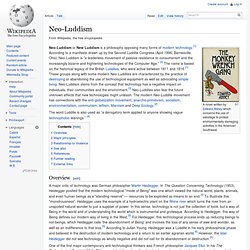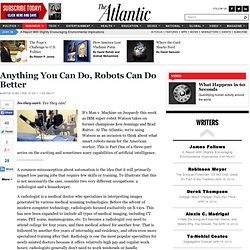

Luddite. The Leader of the Luddites, engraving of 1812 The Luddites were 19th-century English textile artisans who protested against newly developed labour-saving machinery from 1811 to 1817.

The stocking frames, spinning frames and power looms introduced during the Industrial Revolution threatened to replace the artisans with less-skilled, low-wage labourers, leaving them without work. Although the origin of the name Luddite (/ˈlʌd.aɪt/) is uncertain, a popular theory is that the movement was named after Ned Ludd, a youth who allegedly smashed two stocking frames in 1779, and whose name had become emblematic of machine destroyers.[1][2][3] The name evolved into the imaginary General Ludd or King Ludd, a figure who, like Robin Hood, was reputed to live in Sherwood Forest.[4][a] Background[edit] Neo-Luddism. A novel written by Edward Abbey which concerns the use of sabotage to protest environmentally damaging activities in the American Southwest.

Neo-Luddism or New Luddism is a philosophy opposing many forms of modern technology.[1] According to a manifesto drawn up by the Second Luddite Congress (April 1996; Barnesville, Ohio) Neo-Luddism is "a leaderless movement of passive resistance to consumerism and the increasingly bizarre and frightening technologies of the Computer Age. " [2] The name is based on the historical legacy of the British Luddites, who were active between 1811 and 1816.[1] These groups along with some modern Neo-Luddites are characterized by the practice of destroying or abandoning the use of technological equipment as well as advocating simple living. Artificial Intelligence Is the Next Killer App - Martin Ford - Business. It's Man v.

Machine on Jeopardy this week as IBM super-robot Watson takes on former champions Ken Jennings and Brad Rutter. At The Atlantic, we're using Watson as an occasion to think about what smart robots mean for the American worker. This is Part Three of a three-part series on the exciting and sometimes scary capabilities of artificial intelligence. Read Part One --Anything You Can Do, Robots Can Do Better -- and Part Two -- Can a Computer Do a Lawyer's Job? Since the beginnings of the personal computer industry, computer hardware sales have often been driven by a particular software application so compelling that it has motivated customers to purchase the machine required to run it. In recent years, the highest sales growth for the computer industry has not been in high-end desktop computers but instead in laptops and, lately, the newer netbook machines that provide a simple and inexpensive way to browse the web.
The Overselling of Education. This piece originally appeared in the March 2011 edition of The American Prospect.

In discussing rising inequality in the United States, Federal Reserve Board Chair Ben Bernanke recently said, “It’s a very bad development. … It’s creating two societies. And it’s based very much, I think, on educational differences.” A better-educated workforce is widely touted as the panacea for every economic problem. Education is said to be the cure both for unemployment and income inequality. To hear leaders of the financial sector talk, the underlying problem with the economy has not been a runaway financial sector but an unqualified workforce. Or consider the statement of the Minneapolis Federal Reserve Bank president, Narayana Kocherlakota, which removes monetary policy as any part of the solution to current high unemployment: “Firms have jobs, but can’t find appropriate workers.
Cataphora. Armies of Expensive Lawyers, Replaced by Cheaper Software. White Collars Turn Blue. When looking backward, you must always be prepared to make allowances: it is unfair to blame late-20th-century observers for their failure to foresee everything about the century to come.

Long-term social forecasting is an inexact science even now, and in 1996 the founders of modern nonlinear socioeconomics were obscure graduate students. Falling Demand for Brains? And now for something completely different.

About 15 years ago, before I became a regular columnist, the Times asked me and a bunch of other people to contribute to a special edition celebrating the 100th anniversary of the NYT magazine. The stated rule was that the pieces should be written as if submitted in 2096, looking back at the magazine’s second century. As I recall, I was the only contributor who obeyed instructions; everyone else was too concerned about loss of dignity.
Anyway, I decided to write the piece around a conceit: that information technology would end up reducing, not increasing, the demand for highly educated workers, because a lot of what highly educated workers do could actually be replaced by sophisticated information processing — indeed, replaced more easily than a lot of manual labor. Here’s the piece: I still think it’s a fun read. So here’s the question: is it starting to happen? Source. In my mind this raises several questions. Anything You Can Do, Robots Can Do Better. No they can't.

Yes they can! It's Man v. Machine on Jeopardy this week as IBM super-robot Watson takes on former champions Ken Jennings and Brad Rutter. At The Atlantic, we're using Watson as an occasion to think about what smart robots mean for the American worker.